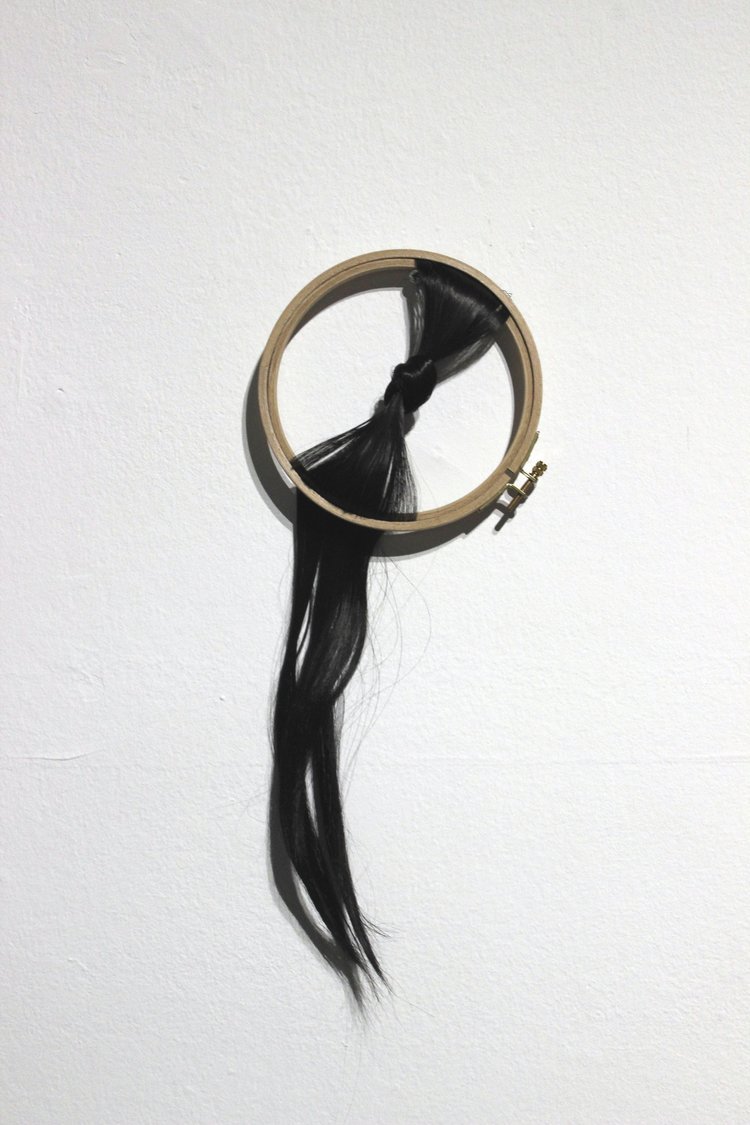Odelia Tang
Honesty in developing a practice
By Woong Soak Teng
Odelia Tang with her work ‘COILING’ (2020). Image courtesy of the artist and RKFA.
In a video excerpt for an exhibition at Richard Koh Fine Art, ‘A Decade Apart / Together’, Singapore artist Odelia Tang quoted the contemporary Japanese artist Fuyuko Matsui: “Pain is something we can sympathetically feel, a condition pointing to a more intuitive realm of communication.” It became a catalyst for Odelia to develop her practice around the negotiation of pain, identity and the unconscious. Working across painting, drawing and sculptural installations, she imbues her materials with metaphorical meanings to relate the universal feeling of affliction.
Odelia Tang, ‘Here Is Where I Lost 2’, 2021, untampered glass shards, acetone paint, industrial glue, insulation foam spray, wood board, 45 x 45cm. Image courtesy of the artist and RKFA.
Incorporating objects like synthetic hair, blades, broken mirrors and glass, Odelia puts together poetic assemblages that articulate visceral emotions of physical and psychological sufferings. In ‘Here Is Where I Lost 2’ (2021), she layers and adheres raw shards of black-coated glass with her hands, creating a precarious and ominous relief. The art-making process is a tactile ritual necessary for Odelia to understand how the material should be treated, in order to convey intangible emotions embedded within the subconscious. Borrowing the inherent characteristics of each material, she meticulously builds up suspended moments of tension and vulnerability.
“The art-making process is a tactile ritual necessary for Odelia to understand how the material should be treated in order to convey intangible emotions embedded within the subconscious.”
Odelia Tang, ‘Time is the Weight I Carry’, 2019, synthetic hair and tulle, 120 x 480cm. Image courtesy of the artist.
Odelia Tang, ‘LAW (Portrait Series)’, 2019, wooden embroidery hoop and synthetic hair, dimensions variable. Image courtesy of the artist.
Odelia’s practice explores permutations of ordinary but universally understood materials. ‘Time is the Weight I Carry’ (2019) and ‘LAW (Portrait Series)’ (2019) are two distinct works utilising synthetic hair on different scales. While the former weaves an excessive quantity of hair into a free-flowing, monochromatic tapestry, the latter entraps a knotted bundle of the same material within an embroidery hoop. Presented in such contrasting states, a single medium can evoke a familiar yet still disconcerting sense of pressure and confinement. In stripping down each work to its essential form, Odelia invites viewers to be up close and personal with it to engage with one’s inner world.
With an emphasis on being present and honest in her artistic journey, Odelia bares her vulnerabilities in hopes of speaking to the pain of others. Reflecting on her education, she relates how important it is to “independently and bravely navigate one’s personal practice to develop it best.” As she continues to experiment with new-found materials purposefully, Odelia’s practice grows with unchanging authenticity.
Click here to read our dialogue with Odelia Tang.

















